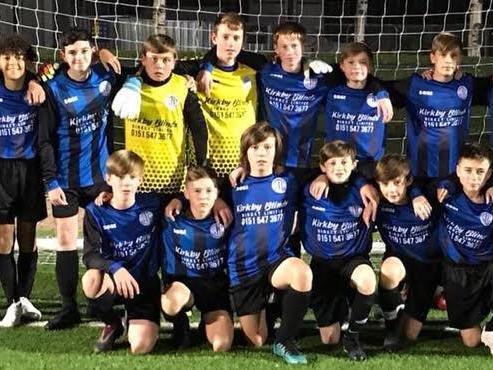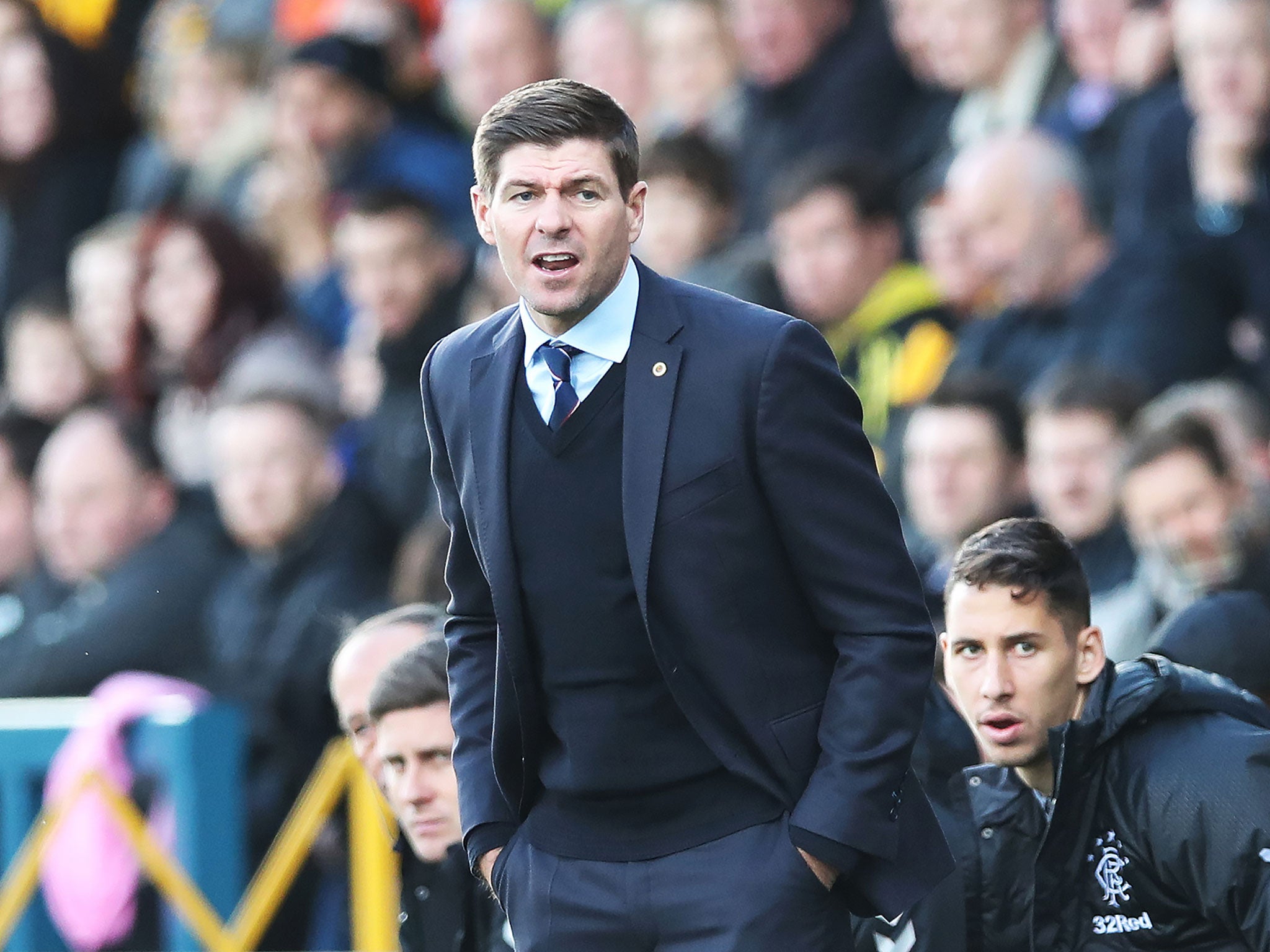How the bleakness of austerity continues to damage school sport
Liverpool legend Steven Gerrard played his first competitive match in the area but the youth team faces expulsion from the National Cup with calls for an appeal ignored

Your support helps us to tell the story
From reproductive rights to climate change to Big Tech, The Independent is on the ground when the story is developing. Whether it's investigating the financials of Elon Musk's pro-Trump PAC or producing our latest documentary, 'The A Word', which shines a light on the American women fighting for reproductive rights, we know how important it is to parse out the facts from the messaging.
At such a critical moment in US history, we need reporters on the ground. Your donation allows us to keep sending journalists to speak to both sides of the story.
The Independent is trusted by Americans across the entire political spectrum. And unlike many other quality news outlets, we choose not to lock Americans out of our reporting and analysis with paywalls. We believe quality journalism should be available to everyone, paid for by those who can afford it.
Your support makes all the difference.It was Sunday morning at eleven o’clock and nobody seemed to know what was happening. Nobody, at least, accounted for just one person – a dog walker called Alf who’d let his King Charles Spaniel tire herself out by racing across the muddy field on Windy Arbor Road in Whiston where Steven Gerrard played his first competitive matches as a junior footballer.
There were no wheels crunching on the gravel as they arrived in the car park, no changing rooms filled with kids waiting to find out whether they were in the starting XI, no parents outside putting the nets up and no referees blowing into their whistles. There was only Alf and the enthusiasm of his dog whose bark seemed to magnify the stillness. It was winter, of course, and in the amateur game this usually leads to postponements. The pitches – though bare – were not freezing, however, and they seemed playable to Alf, as well as myself. “Probably down to numbers,” we speculated, though that theory was later confirmed as being true.
It was a lifeless scene in the borough of Merseyside which has produced three European Cup captains and six Premier League footballers but now – with participation across all amateur levels already in a state of slow, permanent crisis – might see its district team fold after being thrown out of the most prestigious schools competition in England because of a merger that was ratified by a regional authority.
Since the Liverpool Echo reported a fortnight ago that Knowsley and St Helens faced expulsion from the National Cup just a day before their last sixteen tie with East Riding, pleas to the English Schools FA have been ignored and there has been no opportunity for a proper appeal.
At a meeting in Stafford, where it was believed Knowsley and St Helens would be able to present their case, delegates were told flatly to stop complaining and reduce the noise on social media, which by then had led to a campaign aimed at getting the decision overturned.
Last May, Knowsley schoolboys had sought within the rules to amalgamate with St Helens, the district just to the east did not have a representative football team despite having eleven schools to choose from in comparison to just six in Knowsley, which contrasts starkly with the 30 that exist in Liverpool. After receiving initial guidance from the ESFA where Knowsley were informed that the main obstacle related to a unanimous agreement at the Merseyside FA’s AGM, the proposal went to vote and the move was sanctioned.
It is yet to be explained by the ESFA why it has taken until recently to enforce the punishment, with some children telling their parents they feel let down and are considering giving up on football after progressing through three rounds. One parent told The Independent that it is more difficult than ever giving kids the sort of positive focus that keeps them off the streets. “It feels like we’re back to square one,” he said. “Where are they meant to go and play football now? The amateur game elsewhere is on its knees as well. The fellas that run Knowsley should be commended for keeping this team going and trying to find solutions rather than get mysteriously punished half way through the season.”

There was a general feeling that a lot of hard work has gone to waste and an impression existed of a group of bureaucrats making decisions from a distance that could impact on the lives of a generation of young boys.
The problem in Knowsley might be deeper than anyone in Stafford or elsewhere really appreciates. Despite the area’s rich heritage in producing fine young footballers such as Phil Thompson and Dennis Mortimer in addition to Gerrard (who went to school in West Derby, representing Liverpool schools instead) and others like Leighton Baines and Rickie Lambert, for the last few years Knowsley has struggled field a team and this relates to government and local council decisions more than a decade ago, as well as more recent austerity.
It is significant that there has not been a Conservative on Knowsley’s Council since 1995. During the Tony Blair and Gordon Brown years, it is claimed locally that Knowsley’s council would show a keen inclination to act as a sort of laboratory for Labour policies. One of those policies was called Building Schools for the Future and what followed was the closure of eleven secondary schools across the borough with seven new ones built at the cost of more than £150million. Within four years of its opening, however, one of those schools was closed, with less than half of its places filled by students.
By 2015, when 52 per-cent of Knowsley’s sixteen-year-olds opted to take on A-levels, only 29 of the 981 young people were studying in the borough. Two years later, Knowsley became the first local authority in the country to cease offering an A-level education and by then 43-per-cent of Knowsley’s children overall were educated in Liverpool or St Helens.
“A lot of parents simply gave up on the education system in Knowsley because it wasn’t good enough,” said one parent, who recognised a cruel irony in sending his child to St Helens for a better future, thus distorting the geographic and social reality in Knowsley’s argument with the ESFA.

Under the Conservative government the statistics from Knowsley paint the bleakest picture, with half of children attending the six secondary schools eligible for free school meals which is a quarter above the national average. These are the worst figures in the country and this context goes some way to explaining why, while Liverpool voted to remain in the EU referendum, Knowsley voted to leave. Another parent asked: “When it feels like it can’t get any worse, what are we supposed to do?”
In this dire landscape, Everton have stepped in, a club whose community scheme has increased attendances at a primary school where staff were once forced to write to parents over “drug deals and smoking cannabis outside the school gates.” As recently as October 2017, indeed, a seventeen-year-old was shot dead outside those gates in a gang killing.
“The story emphasises the power of football,” another parent stressed. “The more lads that are playing the game the better. I dread to think what might happen if opportunities like these are taken away. I just hope the ESFA has the heart to understand why their decision could have such a catastrophic impact.”
Join our commenting forum
Join thought-provoking conversations, follow other Independent readers and see their replies
Comments